Business Law Report: Commonwealth Bank's Global Expansion Strategy
VerifiedAdded on 2021/06/14
|12
|2960
|33
Report
AI Summary
This report analyzes the Commonwealth Bank (CBA), an Australian multinational bank, focusing on its business operations in Singapore and South Korea. The report, from the perspective of the bank's directors, examines business opportunities, legal frameworks, and challenges in these two jurisdictions. It covers the bank's background, business opportunities, and the legal and regulatory environments in Singapore (including intellectual property, tort, agency, and contract law) and South Korea (contract, tort, and agency laws). The report also explores the factors shaping the Australian banking sector and CBA's competitive advantages. The analysis provides insights into the bank's strategies for international expansion and the importance of adapting to local legal and economic conditions. The report concludes with recommendations for the bank's future growth and success in the international market. The report underscores the importance of understanding local legal systems and adapting to the business environment for successful international operations.
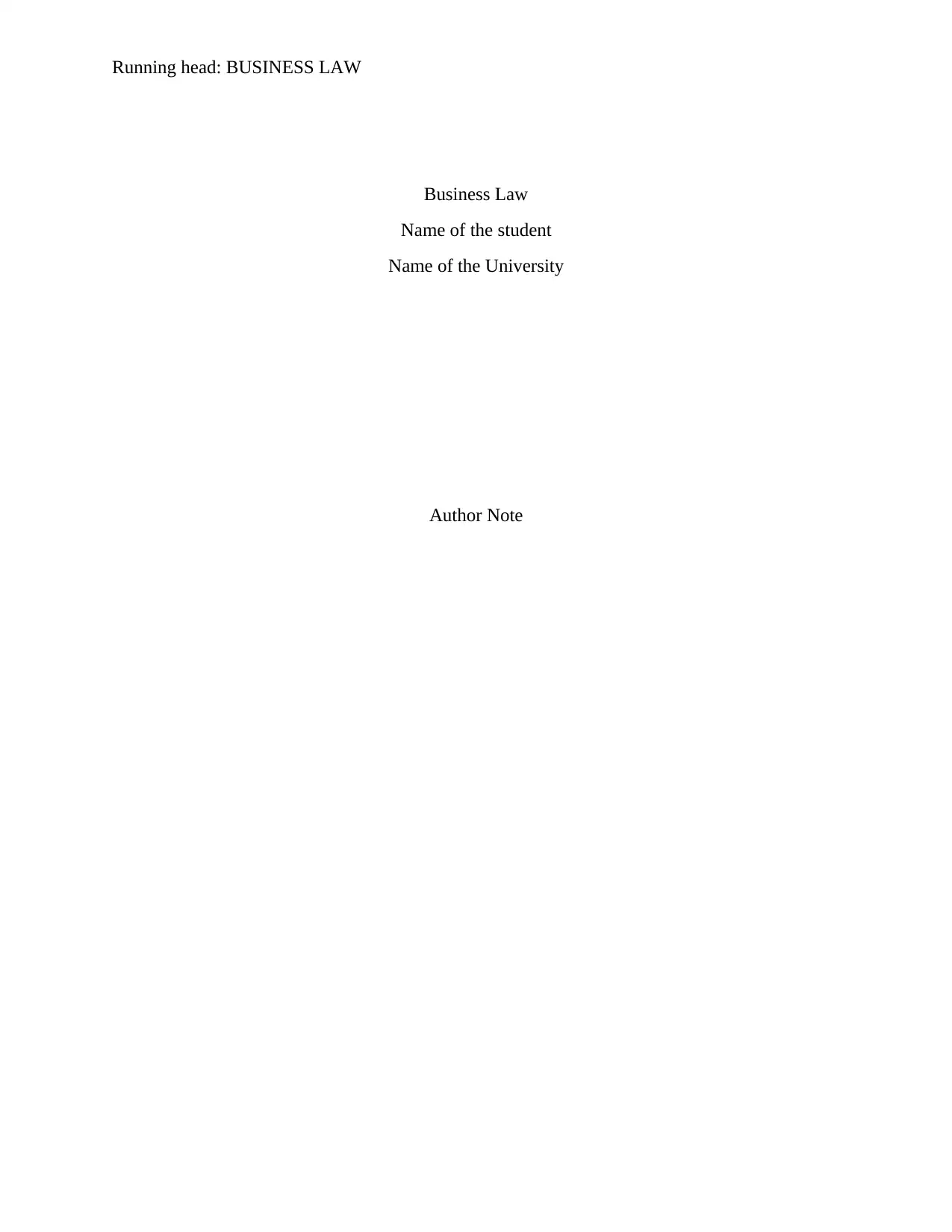
Running head: BUSINESS LAW
Business Law
Name of the student
Name of the University
Author Note
Business Law
Name of the student
Name of the University
Author Note
Paraphrase This Document
Need a fresh take? Get an instant paraphrase of this document with our AI Paraphraser
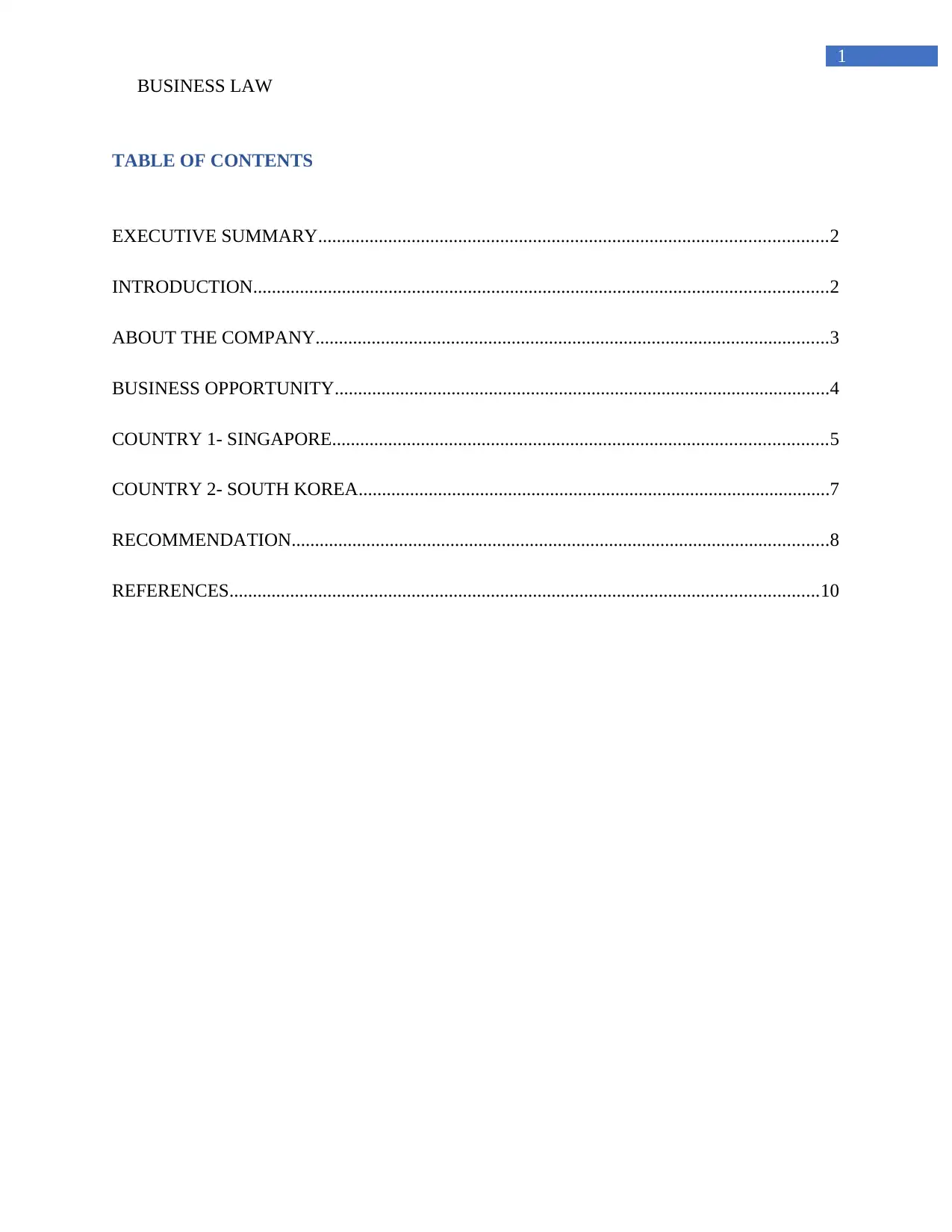
1
BUSINESS LAW
TABLE OF CONTENTS
EXECUTIVE SUMMARY.............................................................................................................2
INTRODUCTION...........................................................................................................................2
ABOUT THE COMPANY..............................................................................................................3
BUSINESS OPPORTUNITY..........................................................................................................4
COUNTRY 1- SINGAPORE..........................................................................................................5
COUNTRY 2- SOUTH KOREA.....................................................................................................7
RECOMMENDATION...................................................................................................................8
REFERENCES..............................................................................................................................10
BUSINESS LAW
TABLE OF CONTENTS
EXECUTIVE SUMMARY.............................................................................................................2
INTRODUCTION...........................................................................................................................2
ABOUT THE COMPANY..............................................................................................................3
BUSINESS OPPORTUNITY..........................................................................................................4
COUNTRY 1- SINGAPORE..........................................................................................................5
COUNTRY 2- SOUTH KOREA.....................................................................................................7
RECOMMENDATION...................................................................................................................8
REFERENCES..............................................................................................................................10
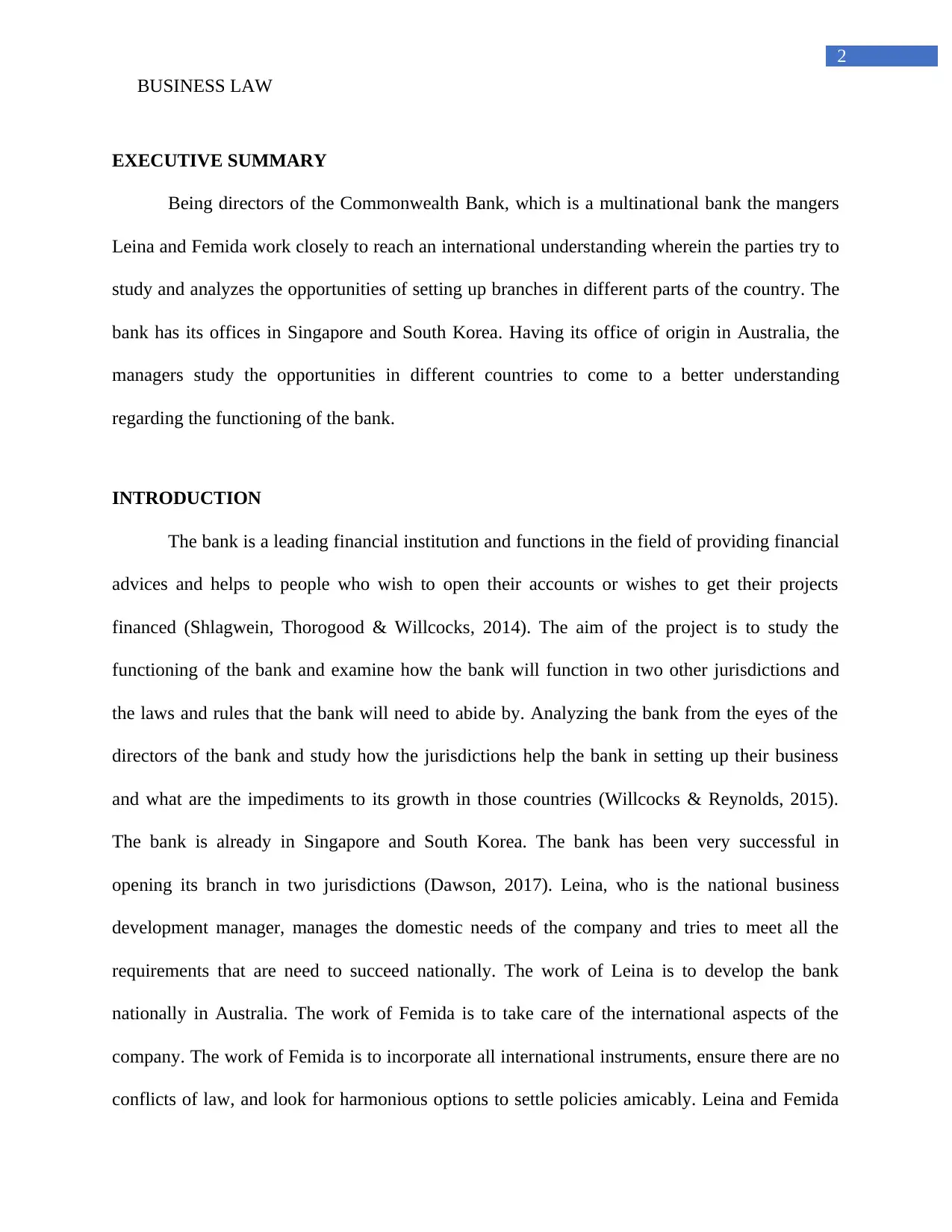
2
BUSINESS LAW
EXECUTIVE SUMMARY
Being directors of the Commonwealth Bank, which is a multinational bank the mangers
Leina and Femida work closely to reach an international understanding wherein the parties try to
study and analyzes the opportunities of setting up branches in different parts of the country. The
bank has its offices in Singapore and South Korea. Having its office of origin in Australia, the
managers study the opportunities in different countries to come to a better understanding
regarding the functioning of the bank.
INTRODUCTION
The bank is a leading financial institution and functions in the field of providing financial
advices and helps to people who wish to open their accounts or wishes to get their projects
financed (Shlagwein, Thorogood & Willcocks, 2014). The aim of the project is to study the
functioning of the bank and examine how the bank will function in two other jurisdictions and
the laws and rules that the bank will need to abide by. Analyzing the bank from the eyes of the
directors of the bank and study how the jurisdictions help the bank in setting up their business
and what are the impediments to its growth in those countries (Willcocks & Reynolds, 2015).
The bank is already in Singapore and South Korea. The bank has been very successful in
opening its branch in two jurisdictions (Dawson, 2017). Leina, who is the national business
development manager, manages the domestic needs of the company and tries to meet all the
requirements that are need to succeed nationally. The work of Leina is to develop the bank
nationally in Australia. The work of Femida is to take care of the international aspects of the
company. The work of Femida is to incorporate all international instruments, ensure there are no
conflicts of law, and look for harmonious options to settle policies amicably. Leina and Femida
BUSINESS LAW
EXECUTIVE SUMMARY
Being directors of the Commonwealth Bank, which is a multinational bank the mangers
Leina and Femida work closely to reach an international understanding wherein the parties try to
study and analyzes the opportunities of setting up branches in different parts of the country. The
bank has its offices in Singapore and South Korea. Having its office of origin in Australia, the
managers study the opportunities in different countries to come to a better understanding
regarding the functioning of the bank.
INTRODUCTION
The bank is a leading financial institution and functions in the field of providing financial
advices and helps to people who wish to open their accounts or wishes to get their projects
financed (Shlagwein, Thorogood & Willcocks, 2014). The aim of the project is to study the
functioning of the bank and examine how the bank will function in two other jurisdictions and
the laws and rules that the bank will need to abide by. Analyzing the bank from the eyes of the
directors of the bank and study how the jurisdictions help the bank in setting up their business
and what are the impediments to its growth in those countries (Willcocks & Reynolds, 2015).
The bank is already in Singapore and South Korea. The bank has been very successful in
opening its branch in two jurisdictions (Dawson, 2017). Leina, who is the national business
development manager, manages the domestic needs of the company and tries to meet all the
requirements that are need to succeed nationally. The work of Leina is to develop the bank
nationally in Australia. The work of Femida is to take care of the international aspects of the
company. The work of Femida is to incorporate all international instruments, ensure there are no
conflicts of law, and look for harmonious options to settle policies amicably. Leina and Femida
⊘ This is a preview!⊘
Do you want full access?
Subscribe today to unlock all pages.

Trusted by 1+ million students worldwide
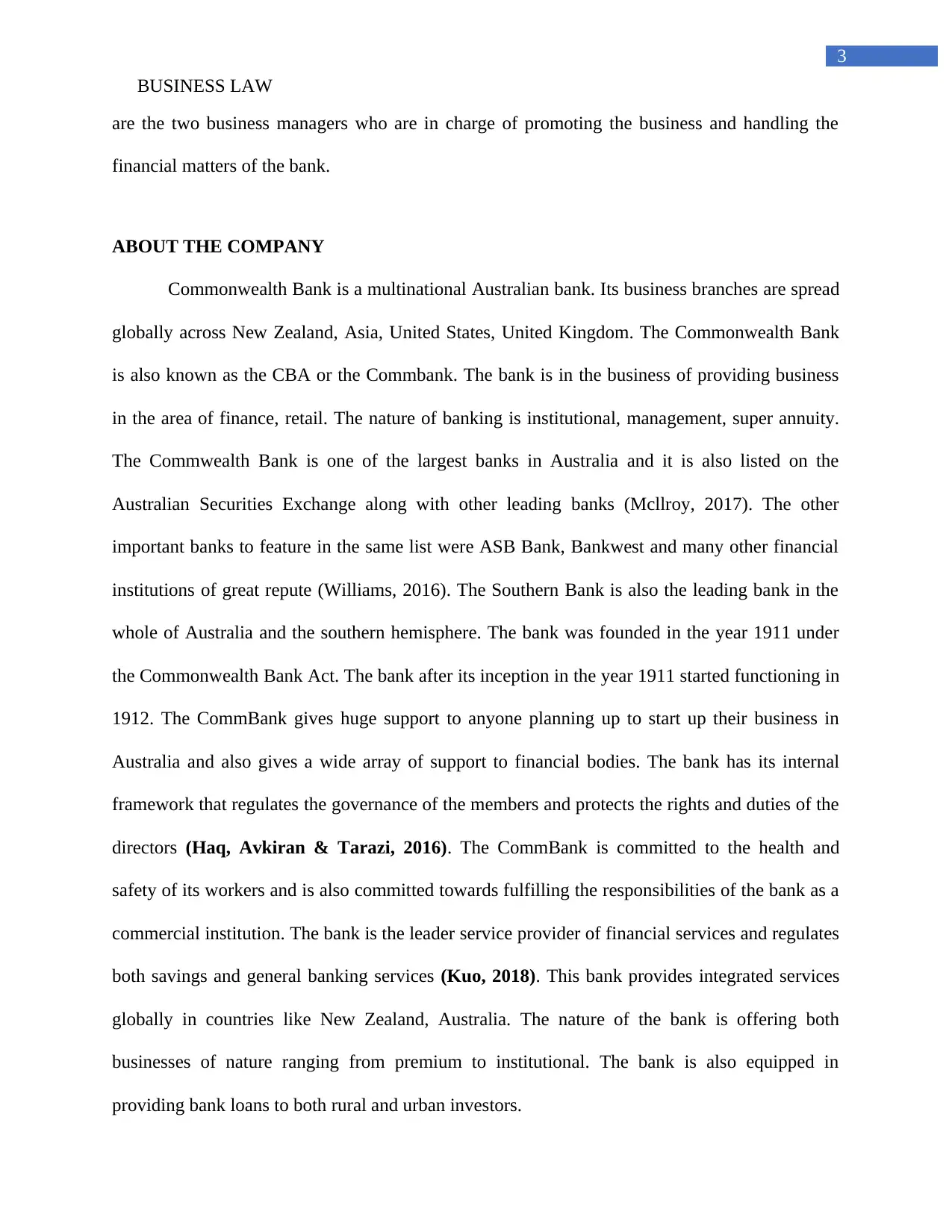
3
BUSINESS LAW
are the two business managers who are in charge of promoting the business and handling the
financial matters of the bank.
ABOUT THE COMPANY
Commonwealth Bank is a multinational Australian bank. Its business branches are spread
globally across New Zealand, Asia, United States, United Kingdom. The Commonwealth Bank
is also known as the CBA or the Commbank. The bank is in the business of providing business
in the area of finance, retail. The nature of banking is institutional, management, super annuity.
The Commwealth Bank is one of the largest banks in Australia and it is also listed on the
Australian Securities Exchange along with other leading banks (Mcllroy, 2017). The other
important banks to feature in the same list were ASB Bank, Bankwest and many other financial
institutions of great repute (Williams, 2016). The Southern Bank is also the leading bank in the
whole of Australia and the southern hemisphere. The bank was founded in the year 1911 under
the Commonwealth Bank Act. The bank after its inception in the year 1911 started functioning in
1912. The CommBank gives huge support to anyone planning up to start up their business in
Australia and also gives a wide array of support to financial bodies. The bank has its internal
framework that regulates the governance of the members and protects the rights and duties of the
directors (Haq, Avkiran & Tarazi, 2016). The CommBank is committed to the health and
safety of its workers and is also committed towards fulfilling the responsibilities of the bank as a
commercial institution. The bank is the leader service provider of financial services and regulates
both savings and general banking services (Kuo, 2018). This bank provides integrated services
globally in countries like New Zealand, Australia. The nature of the bank is offering both
businesses of nature ranging from premium to institutional. The bank is also equipped in
providing bank loans to both rural and urban investors.
BUSINESS LAW
are the two business managers who are in charge of promoting the business and handling the
financial matters of the bank.
ABOUT THE COMPANY
Commonwealth Bank is a multinational Australian bank. Its business branches are spread
globally across New Zealand, Asia, United States, United Kingdom. The Commonwealth Bank
is also known as the CBA or the Commbank. The bank is in the business of providing business
in the area of finance, retail. The nature of banking is institutional, management, super annuity.
The Commwealth Bank is one of the largest banks in Australia and it is also listed on the
Australian Securities Exchange along with other leading banks (Mcllroy, 2017). The other
important banks to feature in the same list were ASB Bank, Bankwest and many other financial
institutions of great repute (Williams, 2016). The Southern Bank is also the leading bank in the
whole of Australia and the southern hemisphere. The bank was founded in the year 1911 under
the Commonwealth Bank Act. The bank after its inception in the year 1911 started functioning in
1912. The CommBank gives huge support to anyone planning up to start up their business in
Australia and also gives a wide array of support to financial bodies. The bank has its internal
framework that regulates the governance of the members and protects the rights and duties of the
directors (Haq, Avkiran & Tarazi, 2016). The CommBank is committed to the health and
safety of its workers and is also committed towards fulfilling the responsibilities of the bank as a
commercial institution. The bank is the leader service provider of financial services and regulates
both savings and general banking services (Kuo, 2018). This bank provides integrated services
globally in countries like New Zealand, Australia. The nature of the bank is offering both
businesses of nature ranging from premium to institutional. The bank is also equipped in
providing bank loans to both rural and urban investors.
Paraphrase This Document
Need a fresh take? Get an instant paraphrase of this document with our AI Paraphraser
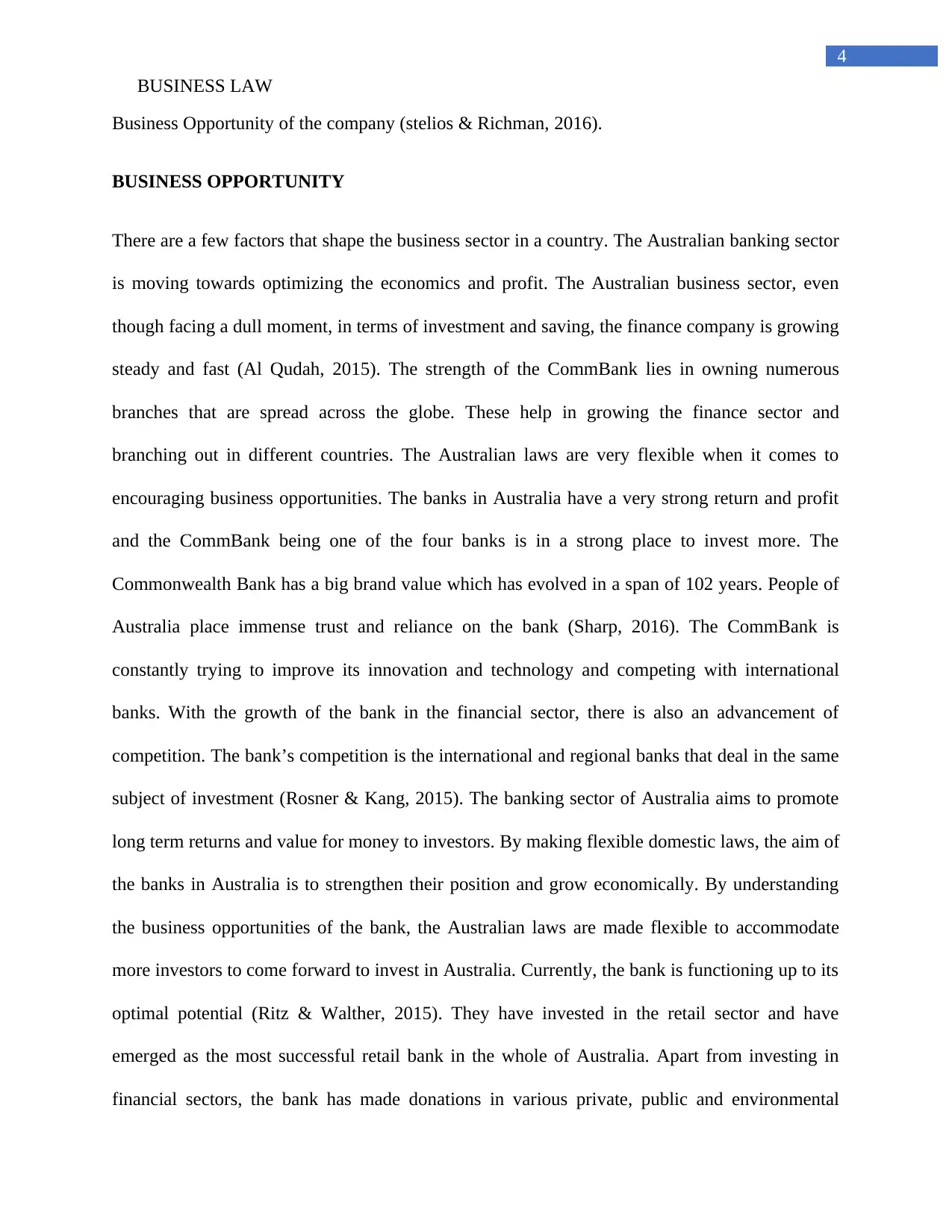
4
BUSINESS LAW
Business Opportunity of the company (stelios & Richman, 2016).
BUSINESS OPPORTUNITY
There are a few factors that shape the business sector in a country. The Australian banking sector
is moving towards optimizing the economics and profit. The Australian business sector, even
though facing a dull moment, in terms of investment and saving, the finance company is growing
steady and fast (Al Qudah, 2015). The strength of the CommBank lies in owning numerous
branches that are spread across the globe. These help in growing the finance sector and
branching out in different countries. The Australian laws are very flexible when it comes to
encouraging business opportunities. The banks in Australia have a very strong return and profit
and the CommBank being one of the four banks is in a strong place to invest more. The
Commonwealth Bank has a big brand value which has evolved in a span of 102 years. People of
Australia place immense trust and reliance on the bank (Sharp, 2016). The CommBank is
constantly trying to improve its innovation and technology and competing with international
banks. With the growth of the bank in the financial sector, there is also an advancement of
competition. The bank’s competition is the international and regional banks that deal in the same
subject of investment (Rosner & Kang, 2015). The banking sector of Australia aims to promote
long term returns and value for money to investors. By making flexible domestic laws, the aim of
the banks in Australia is to strengthen their position and grow economically. By understanding
the business opportunities of the bank, the Australian laws are made flexible to accommodate
more investors to come forward to invest in Australia. Currently, the bank is functioning up to its
optimal potential (Ritz & Walther, 2015). They have invested in the retail sector and have
emerged as the most successful retail bank in the whole of Australia. Apart from investing in
financial sectors, the bank has made donations in various private, public and environmental
BUSINESS LAW
Business Opportunity of the company (stelios & Richman, 2016).
BUSINESS OPPORTUNITY
There are a few factors that shape the business sector in a country. The Australian banking sector
is moving towards optimizing the economics and profit. The Australian business sector, even
though facing a dull moment, in terms of investment and saving, the finance company is growing
steady and fast (Al Qudah, 2015). The strength of the CommBank lies in owning numerous
branches that are spread across the globe. These help in growing the finance sector and
branching out in different countries. The Australian laws are very flexible when it comes to
encouraging business opportunities. The banks in Australia have a very strong return and profit
and the CommBank being one of the four banks is in a strong place to invest more. The
Commonwealth Bank has a big brand value which has evolved in a span of 102 years. People of
Australia place immense trust and reliance on the bank (Sharp, 2016). The CommBank is
constantly trying to improve its innovation and technology and competing with international
banks. With the growth of the bank in the financial sector, there is also an advancement of
competition. The bank’s competition is the international and regional banks that deal in the same
subject of investment (Rosner & Kang, 2015). The banking sector of Australia aims to promote
long term returns and value for money to investors. By making flexible domestic laws, the aim of
the banks in Australia is to strengthen their position and grow economically. By understanding
the business opportunities of the bank, the Australian laws are made flexible to accommodate
more investors to come forward to invest in Australia. Currently, the bank is functioning up to its
optimal potential (Ritz & Walther, 2015). They have invested in the retail sector and have
emerged as the most successful retail bank in the whole of Australia. Apart from investing in
financial sectors, the bank has made donations in various private, public and environmental
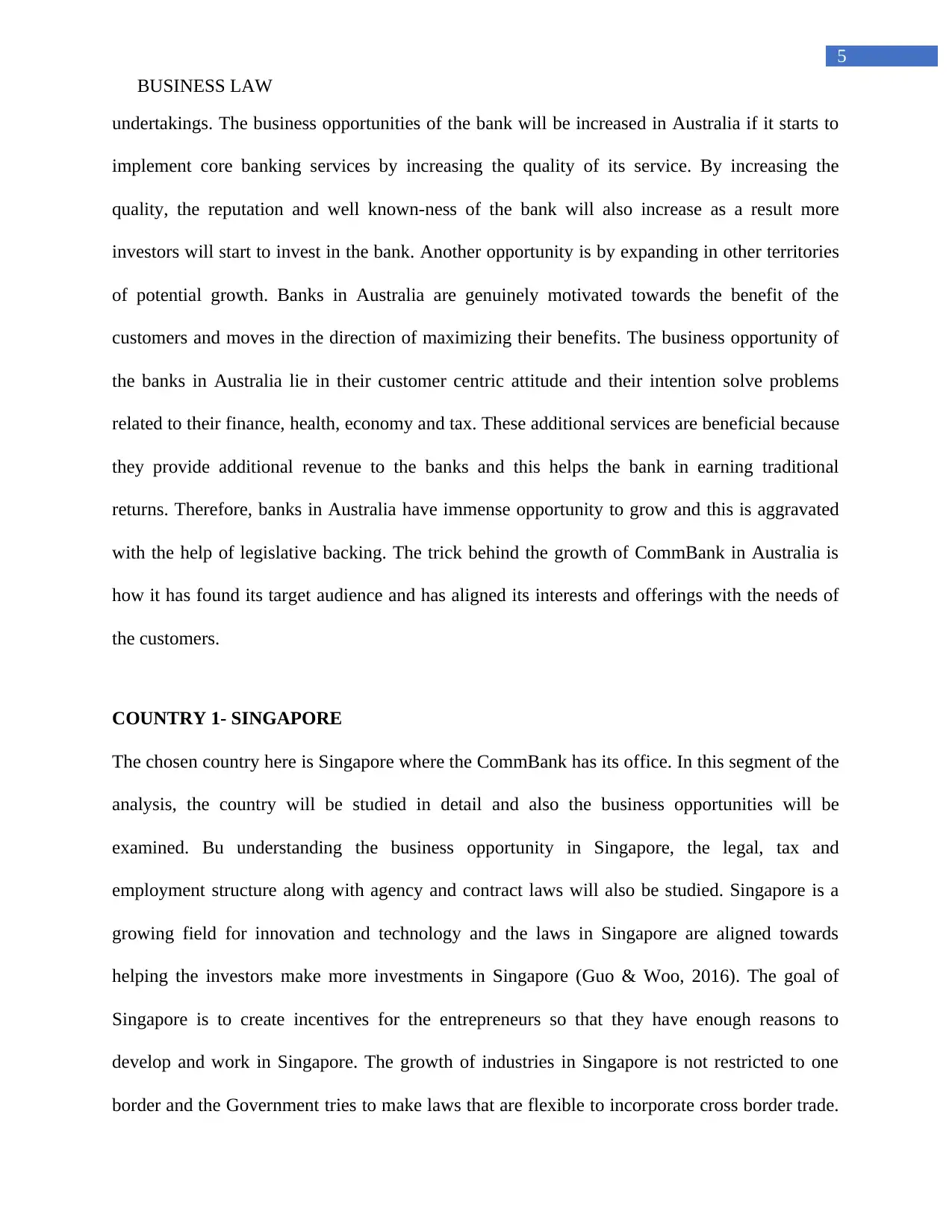
5
BUSINESS LAW
undertakings. The business opportunities of the bank will be increased in Australia if it starts to
implement core banking services by increasing the quality of its service. By increasing the
quality, the reputation and well known-ness of the bank will also increase as a result more
investors will start to invest in the bank. Another opportunity is by expanding in other territories
of potential growth. Banks in Australia are genuinely motivated towards the benefit of the
customers and moves in the direction of maximizing their benefits. The business opportunity of
the banks in Australia lie in their customer centric attitude and their intention solve problems
related to their finance, health, economy and tax. These additional services are beneficial because
they provide additional revenue to the banks and this helps the bank in earning traditional
returns. Therefore, banks in Australia have immense opportunity to grow and this is aggravated
with the help of legislative backing. The trick behind the growth of CommBank in Australia is
how it has found its target audience and has aligned its interests and offerings with the needs of
the customers.
COUNTRY 1- SINGAPORE
The chosen country here is Singapore where the CommBank has its office. In this segment of the
analysis, the country will be studied in detail and also the business opportunities will be
examined. Bu understanding the business opportunity in Singapore, the legal, tax and
employment structure along with agency and contract laws will also be studied. Singapore is a
growing field for innovation and technology and the laws in Singapore are aligned towards
helping the investors make more investments in Singapore (Guo & Woo, 2016). The goal of
Singapore is to create incentives for the entrepreneurs so that they have enough reasons to
develop and work in Singapore. The growth of industries in Singapore is not restricted to one
border and the Government tries to make laws that are flexible to incorporate cross border trade.
BUSINESS LAW
undertakings. The business opportunities of the bank will be increased in Australia if it starts to
implement core banking services by increasing the quality of its service. By increasing the
quality, the reputation and well known-ness of the bank will also increase as a result more
investors will start to invest in the bank. Another opportunity is by expanding in other territories
of potential growth. Banks in Australia are genuinely motivated towards the benefit of the
customers and moves in the direction of maximizing their benefits. The business opportunity of
the banks in Australia lie in their customer centric attitude and their intention solve problems
related to their finance, health, economy and tax. These additional services are beneficial because
they provide additional revenue to the banks and this helps the bank in earning traditional
returns. Therefore, banks in Australia have immense opportunity to grow and this is aggravated
with the help of legislative backing. The trick behind the growth of CommBank in Australia is
how it has found its target audience and has aligned its interests and offerings with the needs of
the customers.
COUNTRY 1- SINGAPORE
The chosen country here is Singapore where the CommBank has its office. In this segment of the
analysis, the country will be studied in detail and also the business opportunities will be
examined. Bu understanding the business opportunity in Singapore, the legal, tax and
employment structure along with agency and contract laws will also be studied. Singapore is a
growing field for innovation and technology and the laws in Singapore are aligned towards
helping the investors make more investments in Singapore (Guo & Woo, 2016). The goal of
Singapore is to create incentives for the entrepreneurs so that they have enough reasons to
develop and work in Singapore. The growth of industries in Singapore is not restricted to one
border and the Government tries to make laws that are flexible to incorporate cross border trade.
⊘ This is a preview!⊘
Do you want full access?
Subscribe today to unlock all pages.

Trusted by 1+ million students worldwide
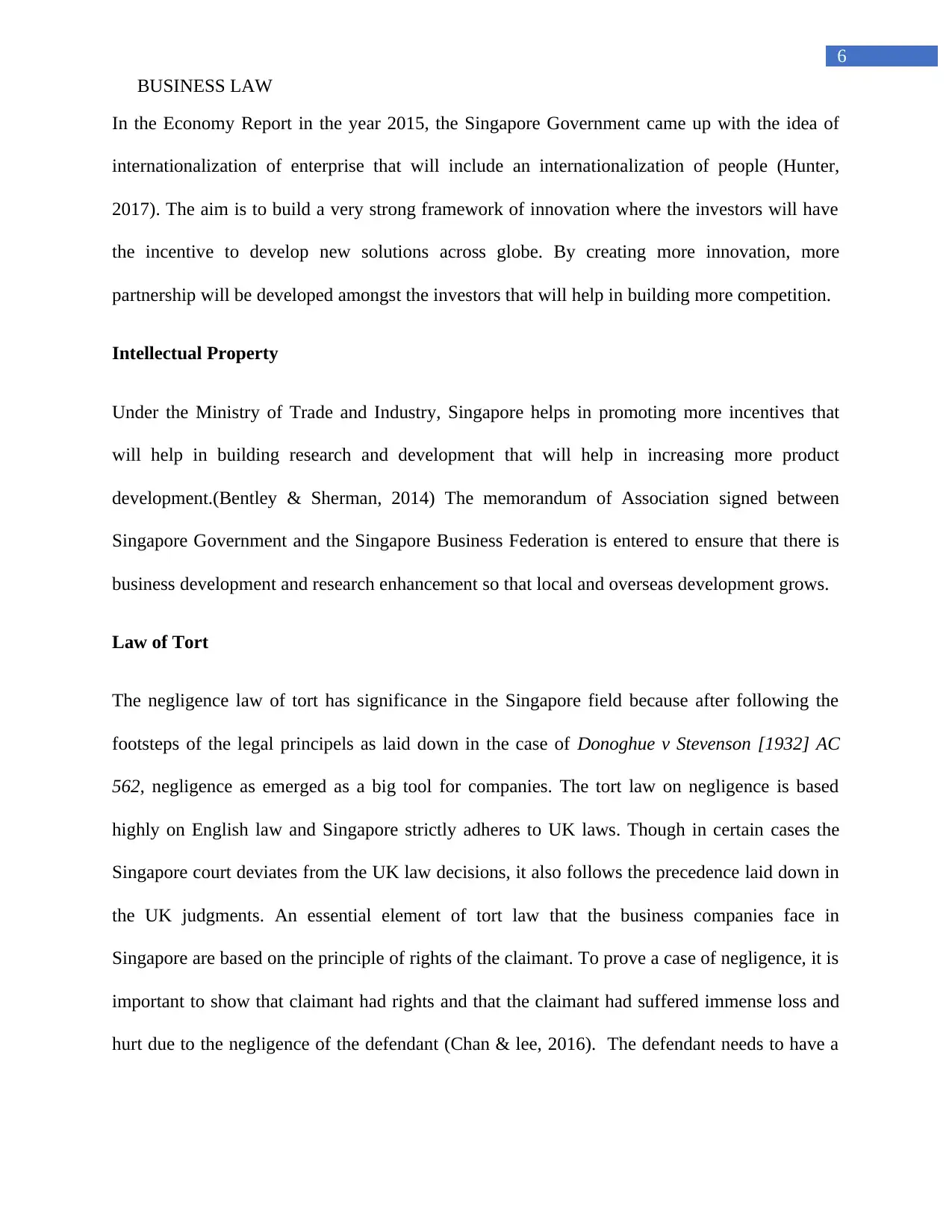
6
BUSINESS LAW
In the Economy Report in the year 2015, the Singapore Government came up with the idea of
internationalization of enterprise that will include an internationalization of people (Hunter,
2017). The aim is to build a very strong framework of innovation where the investors will have
the incentive to develop new solutions across globe. By creating more innovation, more
partnership will be developed amongst the investors that will help in building more competition.
Intellectual Property
Under the Ministry of Trade and Industry, Singapore helps in promoting more incentives that
will help in building research and development that will help in increasing more product
development.(Bentley & Sherman, 2014) The memorandum of Association signed between
Singapore Government and the Singapore Business Federation is entered to ensure that there is
business development and research enhancement so that local and overseas development grows.
Law of Tort
The negligence law of tort has significance in the Singapore field because after following the
footsteps of the legal principels as laid down in the case of Donoghue v Stevenson [1932] AC
562, negligence as emerged as a big tool for companies. The tort law on negligence is based
highly on English law and Singapore strictly adheres to UK laws. Though in certain cases the
Singapore court deviates from the UK law decisions, it also follows the precedence laid down in
the UK judgments. An essential element of tort law that the business companies face in
Singapore are based on the principle of rights of the claimant. To prove a case of negligence, it is
important to show that claimant had rights and that the claimant had suffered immense loss and
hurt due to the negligence of the defendant (Chan & lee, 2016). The defendant needs to have a
BUSINESS LAW
In the Economy Report in the year 2015, the Singapore Government came up with the idea of
internationalization of enterprise that will include an internationalization of people (Hunter,
2017). The aim is to build a very strong framework of innovation where the investors will have
the incentive to develop new solutions across globe. By creating more innovation, more
partnership will be developed amongst the investors that will help in building more competition.
Intellectual Property
Under the Ministry of Trade and Industry, Singapore helps in promoting more incentives that
will help in building research and development that will help in increasing more product
development.(Bentley & Sherman, 2014) The memorandum of Association signed between
Singapore Government and the Singapore Business Federation is entered to ensure that there is
business development and research enhancement so that local and overseas development grows.
Law of Tort
The negligence law of tort has significance in the Singapore field because after following the
footsteps of the legal principels as laid down in the case of Donoghue v Stevenson [1932] AC
562, negligence as emerged as a big tool for companies. The tort law on negligence is based
highly on English law and Singapore strictly adheres to UK laws. Though in certain cases the
Singapore court deviates from the UK law decisions, it also follows the precedence laid down in
the UK judgments. An essential element of tort law that the business companies face in
Singapore are based on the principle of rights of the claimant. To prove a case of negligence, it is
important to show that claimant had rights and that the claimant had suffered immense loss and
hurt due to the negligence of the defendant (Chan & lee, 2016). The defendant needs to have a
Paraphrase This Document
Need a fresh take? Get an instant paraphrase of this document with our AI Paraphraser
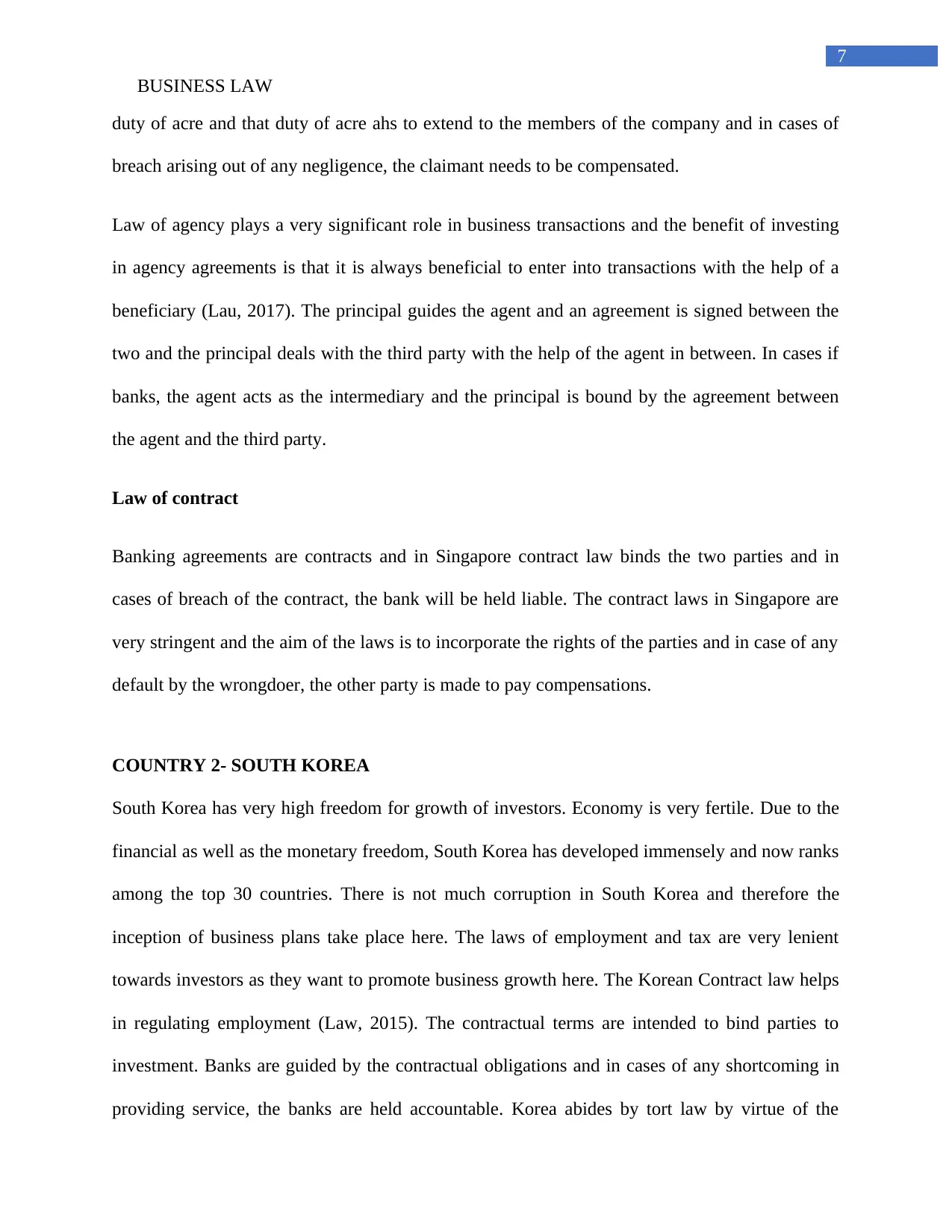
7
BUSINESS LAW
duty of acre and that duty of acre ahs to extend to the members of the company and in cases of
breach arising out of any negligence, the claimant needs to be compensated.
Law of agency plays a very significant role in business transactions and the benefit of investing
in agency agreements is that it is always beneficial to enter into transactions with the help of a
beneficiary (Lau, 2017). The principal guides the agent and an agreement is signed between the
two and the principal deals with the third party with the help of the agent in between. In cases if
banks, the agent acts as the intermediary and the principal is bound by the agreement between
the agent and the third party.
Law of contract
Banking agreements are contracts and in Singapore contract law binds the two parties and in
cases of breach of the contract, the bank will be held liable. The contract laws in Singapore are
very stringent and the aim of the laws is to incorporate the rights of the parties and in case of any
default by the wrongdoer, the other party is made to pay compensations.
COUNTRY 2- SOUTH KOREA
South Korea has very high freedom for growth of investors. Economy is very fertile. Due to the
financial as well as the monetary freedom, South Korea has developed immensely and now ranks
among the top 30 countries. There is not much corruption in South Korea and therefore the
inception of business plans take place here. The laws of employment and tax are very lenient
towards investors as they want to promote business growth here. The Korean Contract law helps
in regulating employment (Law, 2015). The contractual terms are intended to bind parties to
investment. Banks are guided by the contractual obligations and in cases of any shortcoming in
providing service, the banks are held accountable. Korea abides by tort law by virtue of the
BUSINESS LAW
duty of acre and that duty of acre ahs to extend to the members of the company and in cases of
breach arising out of any negligence, the claimant needs to be compensated.
Law of agency plays a very significant role in business transactions and the benefit of investing
in agency agreements is that it is always beneficial to enter into transactions with the help of a
beneficiary (Lau, 2017). The principal guides the agent and an agreement is signed between the
two and the principal deals with the third party with the help of the agent in between. In cases if
banks, the agent acts as the intermediary and the principal is bound by the agreement between
the agent and the third party.
Law of contract
Banking agreements are contracts and in Singapore contract law binds the two parties and in
cases of breach of the contract, the bank will be held liable. The contract laws in Singapore are
very stringent and the aim of the laws is to incorporate the rights of the parties and in case of any
default by the wrongdoer, the other party is made to pay compensations.
COUNTRY 2- SOUTH KOREA
South Korea has very high freedom for growth of investors. Economy is very fertile. Due to the
financial as well as the monetary freedom, South Korea has developed immensely and now ranks
among the top 30 countries. There is not much corruption in South Korea and therefore the
inception of business plans take place here. The laws of employment and tax are very lenient
towards investors as they want to promote business growth here. The Korean Contract law helps
in regulating employment (Law, 2015). The contractual terms are intended to bind parties to
investment. Banks are guided by the contractual obligations and in cases of any shortcoming in
providing service, the banks are held accountable. Korea abides by tort law by virtue of the
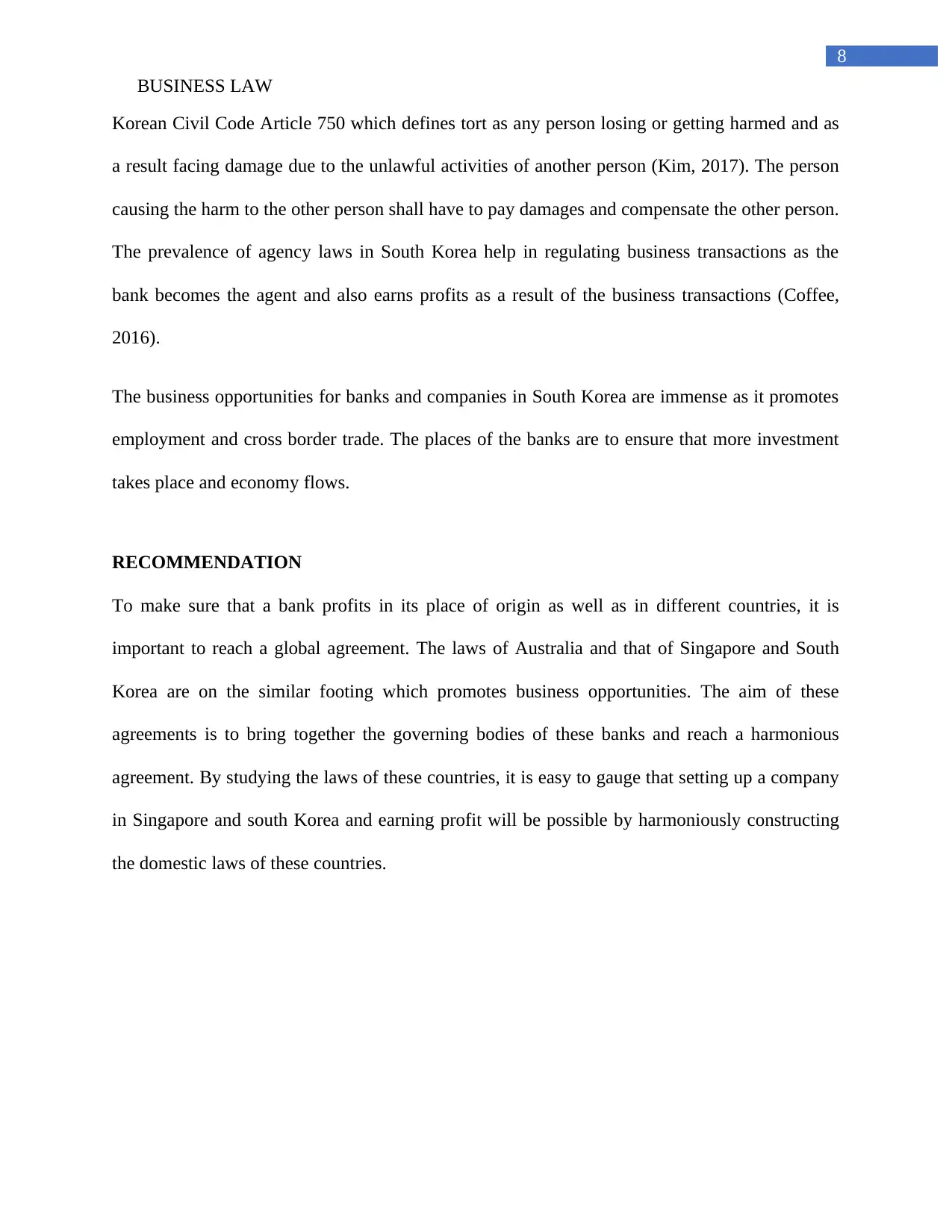
8
BUSINESS LAW
Korean Civil Code Article 750 which defines tort as any person losing or getting harmed and as
a result facing damage due to the unlawful activities of another person (Kim, 2017). The person
causing the harm to the other person shall have to pay damages and compensate the other person.
The prevalence of agency laws in South Korea help in regulating business transactions as the
bank becomes the agent and also earns profits as a result of the business transactions (Coffee,
2016).
The business opportunities for banks and companies in South Korea are immense as it promotes
employment and cross border trade. The places of the banks are to ensure that more investment
takes place and economy flows.
RECOMMENDATION
To make sure that a bank profits in its place of origin as well as in different countries, it is
important to reach a global agreement. The laws of Australia and that of Singapore and South
Korea are on the similar footing which promotes business opportunities. The aim of these
agreements is to bring together the governing bodies of these banks and reach a harmonious
agreement. By studying the laws of these countries, it is easy to gauge that setting up a company
in Singapore and south Korea and earning profit will be possible by harmoniously constructing
the domestic laws of these countries.
BUSINESS LAW
Korean Civil Code Article 750 which defines tort as any person losing or getting harmed and as
a result facing damage due to the unlawful activities of another person (Kim, 2017). The person
causing the harm to the other person shall have to pay damages and compensate the other person.
The prevalence of agency laws in South Korea help in regulating business transactions as the
bank becomes the agent and also earns profits as a result of the business transactions (Coffee,
2016).
The business opportunities for banks and companies in South Korea are immense as it promotes
employment and cross border trade. The places of the banks are to ensure that more investment
takes place and economy flows.
RECOMMENDATION
To make sure that a bank profits in its place of origin as well as in different countries, it is
important to reach a global agreement. The laws of Australia and that of Singapore and South
Korea are on the similar footing which promotes business opportunities. The aim of these
agreements is to bring together the governing bodies of these banks and reach a harmonious
agreement. By studying the laws of these countries, it is easy to gauge that setting up a company
in Singapore and south Korea and earning profit will be possible by harmoniously constructing
the domestic laws of these countries.
⊘ This is a preview!⊘
Do you want full access?
Subscribe today to unlock all pages.

Trusted by 1+ million students worldwide
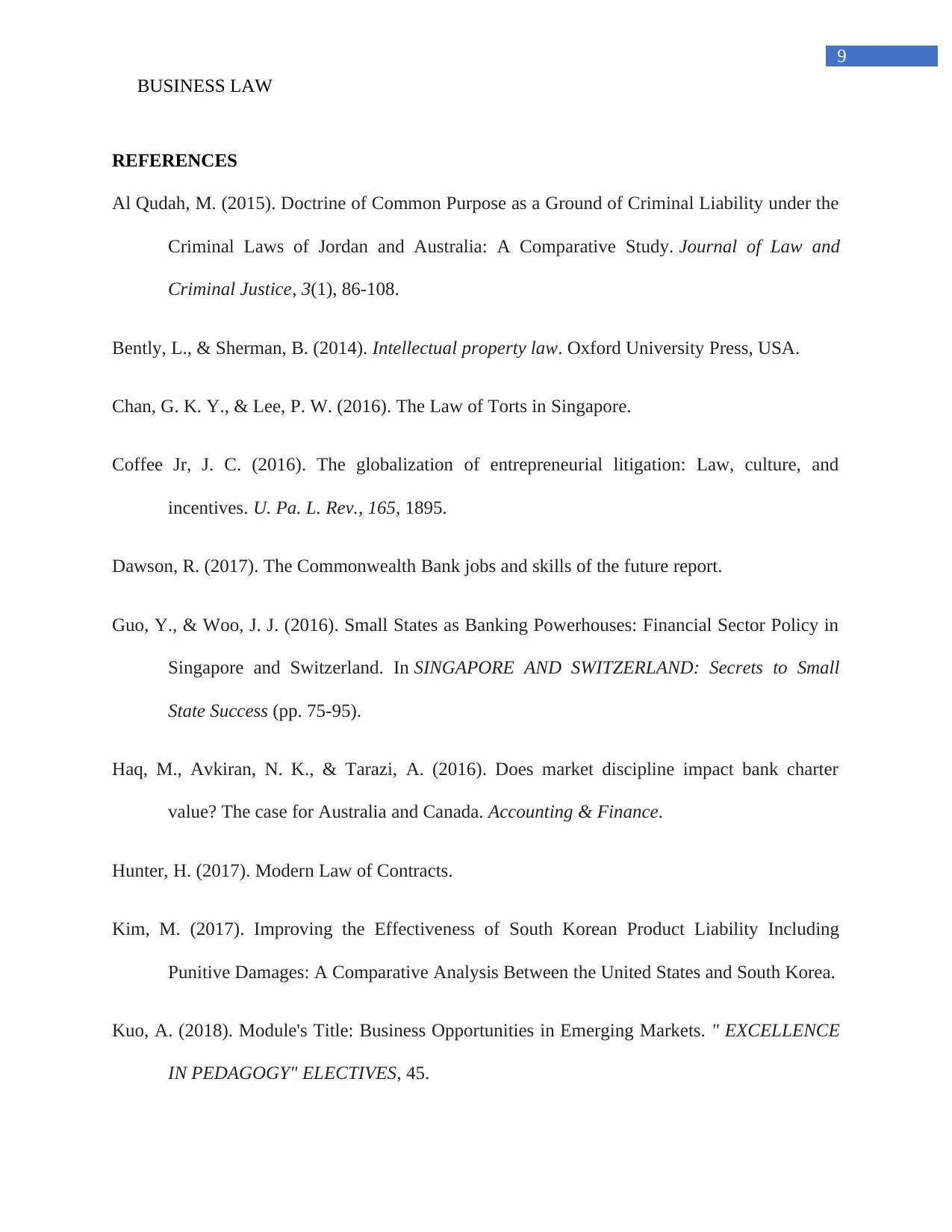
9
BUSINESS LAW
REFERENCES
Al Qudah, M. (2015). Doctrine of Common Purpose as a Ground of Criminal Liability under the
Criminal Laws of Jordan and Australia: A Comparative Study. Journal of Law and
Criminal Justice, 3(1), 86-108.
Bently, L., & Sherman, B. (2014). Intellectual property law. Oxford University Press, USA.
Chan, G. K. Y., & Lee, P. W. (2016). The Law of Torts in Singapore.
Coffee Jr, J. C. (2016). The globalization of entrepreneurial litigation: Law, culture, and
incentives. U. Pa. L. Rev., 165, 1895.
Dawson, R. (2017). The Commonwealth Bank jobs and skills of the future report.
Guo, Y., & Woo, J. J. (2016). Small States as Banking Powerhouses: Financial Sector Policy in
Singapore and Switzerland. In SINGAPORE AND SWITZERLAND: Secrets to Small
State Success (pp. 75-95).
Haq, M., Avkiran, N. K., & Tarazi, A. (2016). Does market discipline impact bank charter
value? The case for Australia and Canada. Accounting & Finance.
Hunter, H. (2017). Modern Law of Contracts.
Kim, M. (2017). Improving the Effectiveness of South Korean Product Liability Including
Punitive Damages: A Comparative Analysis Between the United States and South Korea.
Kuo, A. (2018). Module's Title: Business Opportunities in Emerging Markets. " EXCELLENCE
IN PEDAGOGY" ELECTIVES, 45.
BUSINESS LAW
REFERENCES
Al Qudah, M. (2015). Doctrine of Common Purpose as a Ground of Criminal Liability under the
Criminal Laws of Jordan and Australia: A Comparative Study. Journal of Law and
Criminal Justice, 3(1), 86-108.
Bently, L., & Sherman, B. (2014). Intellectual property law. Oxford University Press, USA.
Chan, G. K. Y., & Lee, P. W. (2016). The Law of Torts in Singapore.
Coffee Jr, J. C. (2016). The globalization of entrepreneurial litigation: Law, culture, and
incentives. U. Pa. L. Rev., 165, 1895.
Dawson, R. (2017). The Commonwealth Bank jobs and skills of the future report.
Guo, Y., & Woo, J. J. (2016). Small States as Banking Powerhouses: Financial Sector Policy in
Singapore and Switzerland. In SINGAPORE AND SWITZERLAND: Secrets to Small
State Success (pp. 75-95).
Haq, M., Avkiran, N. K., & Tarazi, A. (2016). Does market discipline impact bank charter
value? The case for Australia and Canada. Accounting & Finance.
Hunter, H. (2017). Modern Law of Contracts.
Kim, M. (2017). Improving the Effectiveness of South Korean Product Liability Including
Punitive Damages: A Comparative Analysis Between the United States and South Korea.
Kuo, A. (2018). Module's Title: Business Opportunities in Emerging Markets. " EXCELLENCE
IN PEDAGOGY" ELECTIVES, 45.
Paraphrase This Document
Need a fresh take? Get an instant paraphrase of this document with our AI Paraphraser
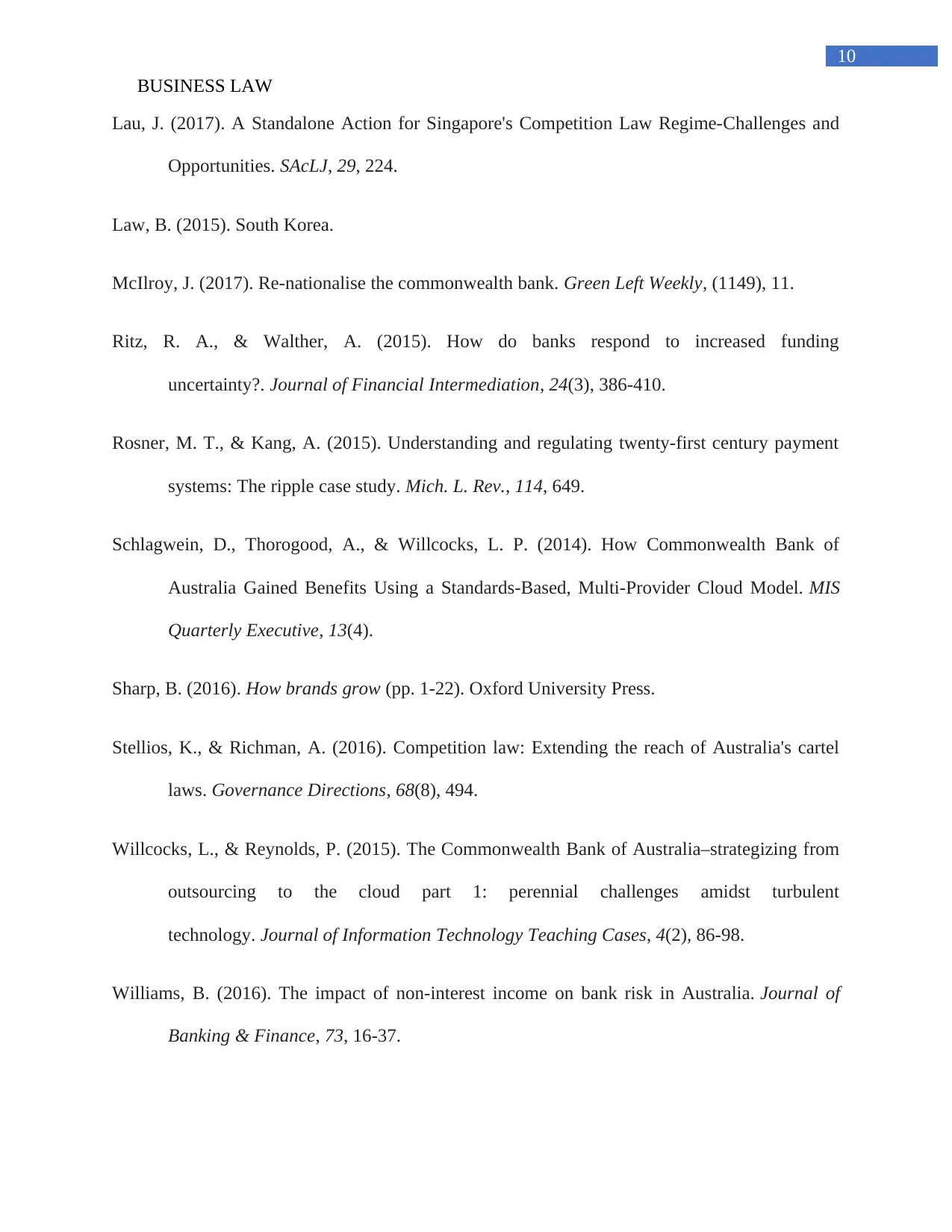
10
BUSINESS LAW
Lau, J. (2017). A Standalone Action for Singapore's Competition Law Regime-Challenges and
Opportunities. SAcLJ, 29, 224.
Law, B. (2015). South Korea.
McIlroy, J. (2017). Re-nationalise the commonwealth bank. Green Left Weekly, (1149), 11.
Ritz, R. A., & Walther, A. (2015). How do banks respond to increased funding
uncertainty?. Journal of Financial Intermediation, 24(3), 386-410.
Rosner, M. T., & Kang, A. (2015). Understanding and regulating twenty-first century payment
systems: The ripple case study. Mich. L. Rev., 114, 649.
Schlagwein, D., Thorogood, A., & Willcocks, L. P. (2014). How Commonwealth Bank of
Australia Gained Benefits Using a Standards-Based, Multi-Provider Cloud Model. MIS
Quarterly Executive, 13(4).
Sharp, B. (2016). How brands grow (pp. 1-22). Oxford University Press.
Stellios, K., & Richman, A. (2016). Competition law: Extending the reach of Australia's cartel
laws. Governance Directions, 68(8), 494.
Willcocks, L., & Reynolds, P. (2015). The Commonwealth Bank of Australia–strategizing from
outsourcing to the cloud part 1: perennial challenges amidst turbulent
technology. Journal of Information Technology Teaching Cases, 4(2), 86-98.
Williams, B. (2016). The impact of non-interest income on bank risk in Australia. Journal of
Banking & Finance, 73, 16-37.
BUSINESS LAW
Lau, J. (2017). A Standalone Action for Singapore's Competition Law Regime-Challenges and
Opportunities. SAcLJ, 29, 224.
Law, B. (2015). South Korea.
McIlroy, J. (2017). Re-nationalise the commonwealth bank. Green Left Weekly, (1149), 11.
Ritz, R. A., & Walther, A. (2015). How do banks respond to increased funding
uncertainty?. Journal of Financial Intermediation, 24(3), 386-410.
Rosner, M. T., & Kang, A. (2015). Understanding and regulating twenty-first century payment
systems: The ripple case study. Mich. L. Rev., 114, 649.
Schlagwein, D., Thorogood, A., & Willcocks, L. P. (2014). How Commonwealth Bank of
Australia Gained Benefits Using a Standards-Based, Multi-Provider Cloud Model. MIS
Quarterly Executive, 13(4).
Sharp, B. (2016). How brands grow (pp. 1-22). Oxford University Press.
Stellios, K., & Richman, A. (2016). Competition law: Extending the reach of Australia's cartel
laws. Governance Directions, 68(8), 494.
Willcocks, L., & Reynolds, P. (2015). The Commonwealth Bank of Australia–strategizing from
outsourcing to the cloud part 1: perennial challenges amidst turbulent
technology. Journal of Information Technology Teaching Cases, 4(2), 86-98.
Williams, B. (2016). The impact of non-interest income on bank risk in Australia. Journal of
Banking & Finance, 73, 16-37.

11
BUSINESS LAW
.
BUSINESS LAW
.
⊘ This is a preview!⊘
Do you want full access?
Subscribe today to unlock all pages.

Trusted by 1+ million students worldwide
1 out of 12
Related Documents
Your All-in-One AI-Powered Toolkit for Academic Success.
+13062052269
info@desklib.com
Available 24*7 on WhatsApp / Email
![[object Object]](/_next/static/media/star-bottom.7253800d.svg)
Unlock your academic potential
Copyright © 2020–2026 A2Z Services. All Rights Reserved. Developed and managed by ZUCOL.





